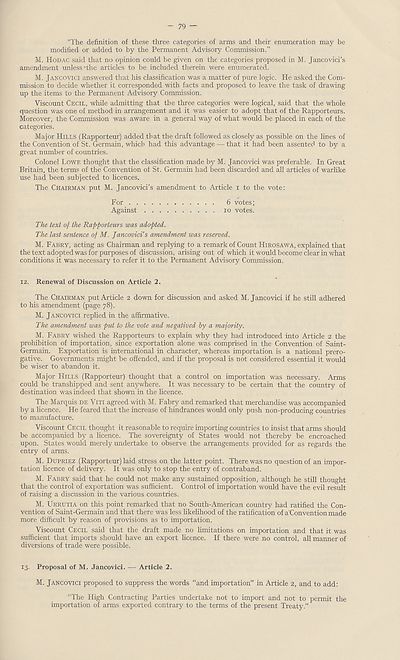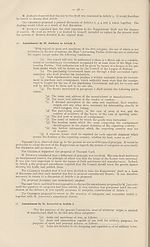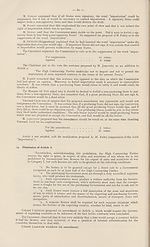Armament > Conference for the control of the international trade in arms, munitions and implements of war
(81)
Download files
Complete book:
Individual page:
Thumbnail gallery: Grid view | List view

79 —
“The definition of these three categories of arms and their enumeration may be
modified or added to by the Permanent Advisory Commission.”
M. Hodac said that no opinion could be given on the categories proposed in M. Jancovici’s
amendment unless *the articles to be included therein were enumerated.
M. Jancovici answered that his classification was a matter of pure logic. He asked the Com¬
mission to decide whether it corresponded with facts and proposed to leave the task of drawing
up the items to the Permanent Advisory Commission.
Viscount Cecil, while admitting that the three categories were logical, said that the whole
question was one of method in arrangement and it was easier to adopt that of the Rapporteurs.
Moreover, the Commission was aware in a general way of what would be placed in each of the
categories.
Major Hills (Rapporteur) added that the draft followed as closely as possible on the lines of
the Convention of St. Germain, which had this advantage — that it had been assented to by a
great number of countries.
Colonel Lowe thought that the classification made by M. Jancovici was preferable. In Great
Britain, the terms of the Convention of St. Germain had been discarded and all articles of warlike
use had been subjected to licences.
The Chairman put M. Jancovici’s amendment to Article i to the vote:
*
For 6 votes;
Against 10 votes.
The text of the Rapporteurs was adopted.
The last sentence of M. Jancovici’s amendment was reserved.
M. Fabry, acting as Chairman and replying to a remark of Count Hirosawa, explained that
the text adopted was for purposes of discussion, arising out of which it would become clear in what
conditions it was necessary to refer it to the Permanent Advisory Commission.
12. Renewal of Discussion on Article 2.
The Chairman put Article 2 down for discussion and asked M. Jancovici if he still adhered
to his amendment (page 78).
M. Jancovici replied in the affirmative.
The amendment was put to the vote and negatived by a majority.
M. Fabry wished the Rapporteurs to explain why they had introduced into Article 2 the
prohibition of importation, since exportation alone was comprised in the Convention of Saint-
Germain. Exportation is international in character, whereas importation is a national prero¬
gative. Governments might be offended, and if the proposal is not considered essential it would
be wiser to abandon it.
Major Hills (Rapporteur) thought that a control on importation was necessary. Arms
could be transhipped and sent anywhere. It was necessary to be certain that the country of
destination was indeed that shown in the licence.
The Marquis de Viti agreed with M. Fabry and remarked that merchandise was accompanied
by a licence. He feared that the increase of hindrances would only push non-producing countries
to manufacture.
Viscount Cecil thought it reasonable to require importing countries to insist that arms should
be accompanied by a licence. The sovereignty of States would not thereby be encroached
upon. States would merely undertake to observe the arrangements provided for as regards the
entry of arms.
M. Dupriez (Rapporteur) laid stress on the latter point. There was no question of an impor¬
tation licence of delivery. It was only to stop the entry of contraband.
M. Fabry said that he could not make any sustained opposition, although he still thought
that the control of exportation was sufficient. Control of importation would have the evil result
of raising a discussion in the various countries.
M. Urrutia on this point remarked that no South-American country had ratified the Con¬
vention of Saint-Germain and that there was less likelihood of the ratification of a'Convention made
more difficult by reason of provisions as to importation.
Viscount Cecil ' said that the draft made no limitations on importation and that it was
sufficient that imports should have an export licence. If there were no control, all manner of
diversions of trade were possible.
13. Proposal of M. Jancovici. — Article 2.
M. Jancovici proposed to suppress the words “and importation” in Article 2, and to add:
“The High Contracting Parties undertake not to import and not to permit the
importation of arms exported contrary to the terms of the present Treaty.”
“The definition of these three categories of arms and their enumeration may be
modified or added to by the Permanent Advisory Commission.”
M. Hodac said that no opinion could be given on the categories proposed in M. Jancovici’s
amendment unless *the articles to be included therein were enumerated.
M. Jancovici answered that his classification was a matter of pure logic. He asked the Com¬
mission to decide whether it corresponded with facts and proposed to leave the task of drawing
up the items to the Permanent Advisory Commission.
Viscount Cecil, while admitting that the three categories were logical, said that the whole
question was one of method in arrangement and it was easier to adopt that of the Rapporteurs.
Moreover, the Commission was aware in a general way of what would be placed in each of the
categories.
Major Hills (Rapporteur) added that the draft followed as closely as possible on the lines of
the Convention of St. Germain, which had this advantage — that it had been assented to by a
great number of countries.
Colonel Lowe thought that the classification made by M. Jancovici was preferable. In Great
Britain, the terms of the Convention of St. Germain had been discarded and all articles of warlike
use had been subjected to licences.
The Chairman put M. Jancovici’s amendment to Article i to the vote:
*
For 6 votes;
Against 10 votes.
The text of the Rapporteurs was adopted.
The last sentence of M. Jancovici’s amendment was reserved.
M. Fabry, acting as Chairman and replying to a remark of Count Hirosawa, explained that
the text adopted was for purposes of discussion, arising out of which it would become clear in what
conditions it was necessary to refer it to the Permanent Advisory Commission.
12. Renewal of Discussion on Article 2.
The Chairman put Article 2 down for discussion and asked M. Jancovici if he still adhered
to his amendment (page 78).
M. Jancovici replied in the affirmative.
The amendment was put to the vote and negatived by a majority.
M. Fabry wished the Rapporteurs to explain why they had introduced into Article 2 the
prohibition of importation, since exportation alone was comprised in the Convention of Saint-
Germain. Exportation is international in character, whereas importation is a national prero¬
gative. Governments might be offended, and if the proposal is not considered essential it would
be wiser to abandon it.
Major Hills (Rapporteur) thought that a control on importation was necessary. Arms
could be transhipped and sent anywhere. It was necessary to be certain that the country of
destination was indeed that shown in the licence.
The Marquis de Viti agreed with M. Fabry and remarked that merchandise was accompanied
by a licence. He feared that the increase of hindrances would only push non-producing countries
to manufacture.
Viscount Cecil thought it reasonable to require importing countries to insist that arms should
be accompanied by a licence. The sovereignty of States would not thereby be encroached
upon. States would merely undertake to observe the arrangements provided for as regards the
entry of arms.
M. Dupriez (Rapporteur) laid stress on the latter point. There was no question of an impor¬
tation licence of delivery. It was only to stop the entry of contraband.
M. Fabry said that he could not make any sustained opposition, although he still thought
that the control of exportation was sufficient. Control of importation would have the evil result
of raising a discussion in the various countries.
M. Urrutia on this point remarked that no South-American country had ratified the Con¬
vention of Saint-Germain and that there was less likelihood of the ratification of a'Convention made
more difficult by reason of provisions as to importation.
Viscount Cecil ' said that the draft made no limitations on importation and that it was
sufficient that imports should have an export licence. If there were no control, all manner of
diversions of trade were possible.
13. Proposal of M. Jancovici. — Article 2.
M. Jancovici proposed to suppress the words “and importation” in Article 2, and to add:
“The High Contracting Parties undertake not to import and not to permit the
importation of arms exported contrary to the terms of the present Treaty.”
Set display mode to:
![]() Universal Viewer |
Universal Viewer | ![]() Mirador |
Large image | Transcription
Mirador |
Large image | Transcription
Images and transcriptions on this page, including medium image downloads, may be used under the Creative Commons Attribution 4.0 International Licence unless otherwise stated. ![]()
| League of Nations > Armament > Conference for the control of the international trade in arms, munitions and implements of war > (81) |
|---|
| Permanent URL | https://digital.nls.uk/195382816 |
|---|
| Shelfmark | LN.IX |
|---|
| Description | Over 1,200 documents from the non-political organs of the League of Nations that dealt with health, disarmament, economic and financial matters for the duration of the League (1919-1945). Also online are statistical bulletins, essential facts, and an overview of the League by the first Secretary General, Sir Eric Drummond. These items are part of the Official Publications collection at the National Library of Scotland. |
|---|---|
| Additional NLS resources: |
|

